#advanced documentary filmmaking
Explore tagged Tumblr posts
Text
Community Heritage Post
"the incest episode" "the ass crack episode" "the law and order episode" "the timeline episode" "the zombie episode" "the std episode" "the dictator episode" "the civil war episode" "the conspiracy theory episode" "the lava episode" "the paintball episodes" "the documentary episodes" "the drug episode" "the g.i. joe episode" "the stop motion episode" "the magic trampoline episode" "the episode with joe biden" "the eastern european war crimes episode" "the video game episode" "the puppet episode" "the body swap episode" "the d&d episodes" "the grifting episode" and the whole time it's just nbc's community (2009)
#personal fave#community heritage post#no way im tagging all the eps mentioned here#but here are some greatest hits for u#epidemiology#geothermal escapism#fistful of paintballs#a few paintballs more#modern warfare#advanced dungeons & dragons#abed's uncontrollable christmas#intergluteal numismatics#documentary filmmaking#documentary filmmaking: redux
2K notes
·
View notes
Text
THE "HOGWARTS: THE REALITY SHOW" FILM CREW
a hogwarts university club. master list
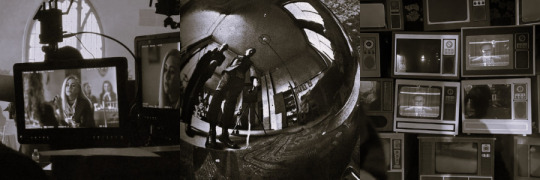
deep within the hallowed halls of hogwarts, where magic and mystery intertwine, there exists a group of students so secretive and audacious, they’ve created an underground sensation unlike anything seen before: hogwarts: the reality show. this clandestine group of aspiring filmmakers and drama enthusiasts has managed to sneak cameras around the school, capturing the juicy, over-the-top drama that naturally unfolds between students—unbeknownst to the rest of the school.

CREW. the crew behind hogwarts: the reality show is an eclectic group of students with an array of talents, from charming charisma to quick thinking and advanced spellwork. they’re united by a single goal: to document the true, unfiltered chaos of student life at hogwarts and turn it into a wizarding world version of reality television.
the crew operates under the radar, gathering footage of everything from quarrels in the great hall to romantic mishaps to outrageous dueling club antics. they’re a tight-knit team that meets in secret, using a complex system of magic to avoid detection. enchanted cameras, disguised as everyday objects like enchanted portraits or ordinary books, are scattered all over hogwarts. in corridors, in the library, even in the bathroom—no moment of high drama goes unrecorded. they’ve even enchanted a few house-elves to help them retrieve footage from hard-to-reach spots (for a small “tip,” of course).

FILMING. the group’s success is built on their ability to stay invisible. they’ve spent countless hours perfecting their spells, using invisibility charms, silent levitation, and even a few disillusionment charms to follow their subjects undetected. their cameras are so discreet, the students they film rarely notice they’re being followed. a mirror that captures reflections but doesn’t show the people around it, a floating book that records audio from across the room—all of these tools come together to create an impressive “spy” network that lets the crew capture every emotional outburst, dramatic conversation, and spontaneous outburst of magic.
but it’s not all magic tricks and secrecy. the crew has also learned to leverage their relationships with certain students who crave the spotlight. these students often “accidentally” find themselves in situations that are tailor-made for hogwarts: the reality show, providing prime footage for the crew to edit into explosive episodes.

THE SHOW. the episodes of hogwarts: the reality show are carefully curated to deliver maximum entertainment. each episode is full of dramatic moments, epic confrontations, and carefully constructed narrative arcs that highlight the larger-than-life personalities of the hogwarts student body. the crew edits the footage into mini-drama documentaries, making sure to emphasize every bit of conflict and awkwardness.
for example, an episode might start with the tension between two rival students—perhaps a gryffindor and a slytherin—who’ve been feuding over something trivial, like a stolen spellbook or an accidental hex. the episode will slowly build, cutting between their conversations, the gossip spreading through the halls, and snippets of their magical mishaps (a misplaced charm that causes a group of students to uncontrollably burst into song, for example).
each episode ends with a cliffhanger, of course. will the two rivals make amends, or will their rivalry escalate into an all-out duel in the great hall? will the romantic interest between two students bloom into something more, or will one of them get embarrassed by an ill-timed love potion?
but the drama isn’t confined to just arguments and crushes. there are episodes about classes gone wrong—like the time a potions class accidentally turned half the students into chickens (a very juicy episode) or the infamous dueling club drama that involved an impromptu duel between the heads of houses over a disagreement about students’ “fighting styles.” some episodes even delve into the day-to-day struggles of hogwarts students, like trying to avoid being caught by professor snape while sneaking into the restricted section of the library, or attempting to complete a homework assignment while under the influence of an accidental sleeping charm.

BROADCASTING. the true brilliance of the crew is how they’ve managed to broadcast the episodes to the student body—discreetly, of course. they’ve enchanted an old, forgotten magical mirror in the common room of each house to display the episodes during the most unexpected times—usually when students are relaxing between classes or during late-night study sessions. the mirrors are programmed to show the latest episode as a “random” event, though the students quickly figure out that the episodes are highly anticipated.
sometimes, during dinner in the great hall, an enchanted mirror will flash to life, casting shadows of hogwarts: the reality show onto the walls, much to the amusement (or horror) of those featured. no student is safe from the show’s scrutiny, but it’s all in good fun—mostly. many students laugh it off, while others cringe and whisper about who might be next to have their most embarrassing moment aired for all to see.
the episodes are released weekly, but the production crew always leaves little surprises for their viewers. occasionally, they’ll leak a “bonus” episode that wasn’t meant to air yet, offering an even more unfiltered look at what’s really happening behind the scenes at hogwarts.

IMPACT. despite the secrecy and the drama, the show has united the student body in a unique way. students gossip about the latest episodes, discuss their favorite moments, and speculate about who’s going to be featured next. the crew is careful to keep the show lighthearted, so even if some students are caught in less-than-flattering situations, they know that it’s all in the name of entertainment.
however, as the episodes gain popularity, there’s growing concern about who might start catching on. a few professors have become suspicious, and some students are beginning to notice that certain events seem to have a way of getting “perfectly captured” on film. will the crew’s secret remain intact, or will their reality TV empire come crashing down?

the question looms: will hogwarts: the reality show ever face the wrath of those who prefer their drama to remain unseen? or will it continue to thrive, capturing the chaotic heart of hogwarts for years to come? one thing’s for sure—the drama is only just beginning.
#koifishog#𓅓⋆˚࿔ koifish HU#scripting#shifting motivation#reality shifting#shiftblr#shifting#shifting community#hogwarts uni#shifting script#shifting blog#shifting antis dni#shifting to hogwarts#shifting realities
87 notes
·
View notes
Text
THEME: RPGs for Accessible Gaming
The RPGs for Accessible Gaming Bundle is currently live, and it's raising some money for a great cause: DOTS Braille Dice, which makes tabletop gaming more accessible for blind gamers. Here's a few great games that you can find in this gigantic bundle!


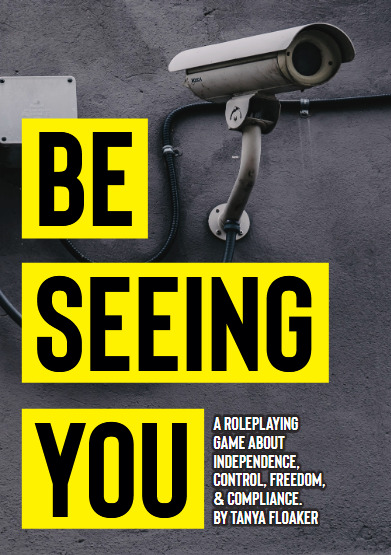

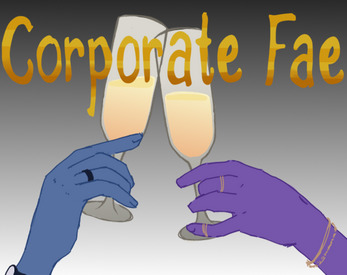

Arkyvr, by Alewood Games.
ARKYVR is a multimedia MOTHERSHIP 1E setting & toolkit to play documentary filmmakers in space for 1-4 players and 1 GM.
Equipped with only their camera gear, ARKYVRs will attempt to document life in space and expose corporate client atrocities while surviving the void’s unspeakable horrors. Players will make ends meet through corporate media contracts but with each assignment they will also find horrible truths hidden just under the surface of their mission. If the ARKYVR crew survives their film shoot, they must then decide how to distribute their footage. Some clients will pay a handsome price to cover up their atrocities while others will use it to lead a revolution. How will players use their recorded stories to shift the balance of power? Will they even live long enough to tell the story?
Created by and in collaboration with industry filmmakers! ARKYVR is a 60 page zine that brings a unique vision to deadly space adventures through the lens of a camera!
ARKYVR only works if you have a copy of MOTHERSHIP to play with it with, but since the core rules of MOTHERSHIP are free to access, this shouldn't stop you from being able to pick up the game and enjoy it's film-making twist. Each character concept comes with duties: elements of the role's job that help you define your character and give them some bones to build a personality off of. The core rules of the game are re-contextualized around missions that involve capturing footage, rather than investigating jobs gone wrong.
I feel like ARKYVR has the potential to combine the horror of space with the lovely irony present in horror movies that involve artists getting in way over their head for the pursuit of the art that they love. How much will they sacrifice for the perfect shot? What kind of art does their team want to make? What kind of art can their team afford to make? What dark secrets will they uncover in the process?
Fang, by Joel Happyhil.
You’re a Fang, an ageless super-powered being living among humans, you live in city that doesn’t matter surrounded by people who won’t live to see a fraction of your life, yet you can’t help but be intrigued. You are driven by your desire, an ever-growing thirst that has the power to reduce you to something less than human, but who knows how long that could take.
Here's a game for the vampires and their human companions. FANG has a lot of common hallmarks when it comes to what you think about ttrpgs: stats with ratings attached (in this case in the form of dots), playbooks that define your character type, and a method of advancement, to show how your PC grows over time. Similar to Blades in the Dark, there's dice pools and staggered resolution levels. There's also a thirst track that increases and decreases as your vamp experiences the visceral parts of life, like physical harm, strong emotions, or the thrill of victory.
What I love in games like this is when you see what happens when you hit your character's limit. In FANG, this limit is Starvation - when your Thirst track hits 12. Your character has an outburst, or breaks down, pushing you closer and closer to getting taken out of the scene. On the other side of the coin, Human characters have a Passion track, which is less powerful than Thirst, but also exempts them from the consequences of Starvation.
If you want a game about a desperate character having a terrible time, you'll likely find some really satisfying moments in FANG.
Be Seeing You, by Tanya Floaker.
This roleplaying game contains dangerous levels of dystopian science fiction, social allegory, and psychological drama.
Influenced by fiction in the vein of The Prisoner, Stalker, and Utopia, and real struggles against mass surveillance, the Hostile Environment, and the alienating effects of capitalism.
Be Seeing You is a game about surveillance and dystopia, but it's also a collaborative world-building exercise, building a story through a series of short vignettes. No character is controlled by one single person; each player will pick up the role of the Prisoner throughout the story, focusing on how this central character is treated by the village and its residents.
The game itself is diceless; things change in the story based on the kinds of choices you make when it comes to answering the prompts and following the parts of the story that are interesting to you. This is a game that thrives with a group that feels comfortable in the dystopian genre and loves hitting thematically resonant story beats.
Pretty Beastly, by Em Hubbard.
Calling all disaffected furniture, oppressed appliances, and humble housewares ready to rise up against monstrous monarchists! You were once simple servants in the household of an overbearing oligarch. Years ago, you were victims of an unfair curse and now you really are objects - dishes, chairs, mirrors, and ornaments. The time has now come to rise up against your Prince, defeat the vile sorcerer, and fight back against an oppressive social system!
Pretty Beastly is a collaborative roleplaying game for 2-5 players. Players work together to create a story of cursed household servants struggling against their oppressive social system. A deck of cards will help determine your challenges, successes, and failures.
Taking inspiration from animated musicals and dramatic historical epics, a fantastical (problematic) fairy tale collides with the French Revolution. Quirky and political, this game will take you on a wild anti-establishment musical adventure.
Welcome to the story of Beauty and the Beast, from the furniture's point of view. Set firmly in the setting of 18th century, this is a game of rage and revenge; working as a group to escape, defeat, or break the chains you find yourselves under as the servants of cursed and cruel monarch. The game is played over a series of scenes, using playing cards to provide inspiration for challenges as well as the means by which you can overcome those challenges. There's also a hilarious addition of musical numbers, where your characters break into song if you draw a low-enough card.
Corporate Fae, by ryland.s.
You’re a really weird fae, as far as everyone knows, you’re the only one who’s got an obsession with human corporate work life. Fortunately for you, you can stand in as someone’s secretary, manager, or the barista across the building. Unfortunately for humans, they don’t remember you before and after you temporarily take up someone’s position.
A close human friend asks you to attend some company galas and parties to do some corporate espionage and learn some gossip your friend can monopolize.
All you need is a deck of standard playing cards without the jokers, a way to record, and some time to play.
Hello solo gamers, I haven't forgotten about you! Corporate Fae is a prompt-based solo game that uses a deck of cards to generate details that allow you to imagine a story about a fae trying to commit corporate espionage.
The game is rather simple; you draw to determine the role you've taken and the kind of party you attend, and then continue to draw various juicy pieces of gossip that your fae will overhear. I think it might be interesting to try and piece the bits of gossip together, to paint a portrait of a slowly unraveling secret being pieced together from the various bits of information you gather while socializing at the party.
The only criticism I have for this game is that there isn't a great way to wrap up the game in a neat little bow at the end - I think I would have loved some kind of tension underneath getting found out, or perhaps a timer that gives you a hard limit on how much time you have to gather information before you need to leave the party - maybe like a clock-strikes-midnight situation or something like that.
Darkest Hour, by Emmeryn.
Here, a night like any other.
Rays of sunlight slowly recede over the wilds, the cabin, the steeple, the mausoleum. A gathering of friends, allies, comrades, hunters, united in their cause. They may not yet realize the danger they are in, but a cruel eye turns upon them. Something cursed awakens, stirring to life with the fall of dusk. A hunger claws free from the pitch black.
In the darkest hours of night, hearts tighten as untold horrors bear down. Fangs, claws, the glint of rusted steel and the scrape of bone. Howls and screams resound in the darkness, creeping ever closer.
Will you live to see the light of day?
Darkest Hour is a horror tabletop game designed for one-shot horror sessions. It can be played as a GMless game or with a GM, and can accommodate 2 to 5 players (with or without a GM) for one to two play sessions totaling 2 to 5 hours. It can be played with as little as the book and three six-sided dice.
Say hello to a one-shot horror game that can provide multiple sessions of fun, thanks to the various settings and horrors you can combine for a different theme each time. Your characters are hunters, pursuing a monstrous and terrible haunt that has trapped them somewhere. You use six-sided dice to try and overcome the challenges this story throws at you, each obstacle becoming harder and harder to overcome the longer the story goes.
The author refers to the work of Avery Alder, but I feel that in some ways, there's also a little bit of Ten Candles hidden in the roots of this game, especially with the rising doom the further into the story you go. That being said, the Haunt does have a weakness, and defeating them is much more likely to happen than in a Ten Candles game. If you want a game that's dripping in monster vibes, you probably want Darkest Hour.
Other Games I've Recommended in the Past…
Teenagers With Attitude and Post Apo Calypse, by CardboardHyperfix.
A Witch, A Gallows Bird, by Jellyfishlines.
Protect the Child and Copper Shores by me!
Wrath of the Undersea, by EfanGamez.
If you like what I do, you can always leave a tip at my Ko-Fi!
63 notes
·
View notes
Text
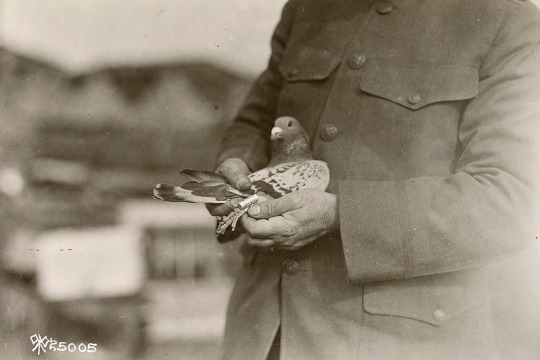

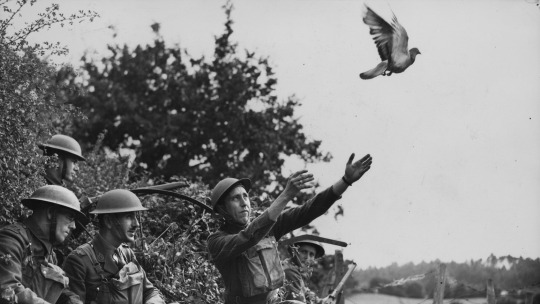
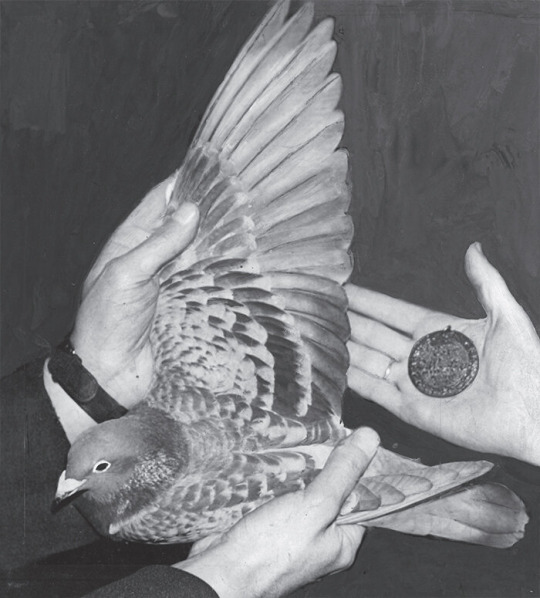
For centuries, the fastest way to send a message over a long distance was by homing pigeon. These birds carried news of a new pharaoh to all corners of ancient Egypt and relayed the results of the Olympics to the ancient Greeks. They were even one of the earliest forms of military communication, used during wars in the days of Julius Caesar and Hannibal.
Nowadays, pigeons still get to show off their skills in the sport of racing. Released in unfamiliar locations, they can find their way home from hundreds of miles away, flying at speeds up to 60 miles an hour. But they've long been replaced by advanced technology to communicate long distance, so you might be surprised to learn that they were still used by the military as late as the Second World War.
Unlike radio, messages sent by pigeon couldn't be overheard by enemy spies, and the birds often came through when technology didn't. One such hero was a bird called G.I. Joe, who saved the day for British troops when they occupied Colvi Vecchia, Italy, during World War II. The Germans had retreated unexpectedly, so the British moved in and tried to cancel the planned U.S. bombing of the city. But all their attempts to communicate failed — except for G.I. Joe, who arrived back at the air base just as the bombers were preparing to take off.
Although pigeons are born with the instinct to return to their home loft, making them effective messengers in wartime took special training. Most of the men who did this training have passed on, but filmmaker Alessandro Croseri captured the memories of some of them for a series of documentaries called The Pigeoneers.
For his first film, Croseri interviewed Col. Clifford A. Poutre, chief pigeoneer of the U.S. Army Signal Corps, before his death at the age of 103. Croseri says that Poutre "changed the whole attitude about how they were training the birds." During World War I, trainers thought the pigeons needed to be starved to make sure they'd return. In contrast, said Croseri, Poutre believed "it's all about kindness and love."
With this positive approach, the pigeons were trained to perform remarkable feats, sometimes at odds with their natural tendencies. One was flying at night. "The German snipers were looking for the birds — they would shoot them down," says Croseri. Night flying made it harder for snipers, but for a daytime bird like the pigeon, it's quite unnatural. The pigeoneers made it possible by training the birds to a route during the day and then patiently retraining the same route at night.
Pigeons were also trained to fly over open water — a natural skill for a gull or an albatross, but something a pigeon would never do on its own. This skill allowed pigeons to be carried on planes and used to communicate the location of a downed crew when other means of communication were destroyed.
Perhaps most amazing is that some pigeons were trained to return to new places so they could be used in different locations. Normally, the loft a pigeon is trained to when it's young is where it will return for the rest of its life. "The terminology in pigeon lingo is we say you 'make him stick,' which means you're training him to a new location and they're not going back to the old location," says Croseri, "which is usually a very difficult thing to do because their homing instinct is to go back to the place they were trained originally." But at least some birds learned to do this, including the famous G.I. Joe, who delivered messages for the troops in several places including Tunisia and Italy.
Some pigeons were also trained to mobile lofts that could be moved along with the changing location of the front lines. "They would move the loft…in a straight line every day for a mile, up to 25 miles," says Croseri. "They told me the birds were extraordinary. They were sticking to the lofts immediately."
Swift, loyal, intelligent, indefatigable; devoted parents and loving mates; the bravest and most masterful navigators of the animal kingdom. Dogs may receive the formal honor of Man’s Best Friend, but next time you see a humble city pigeon scavenging along the sidewalks, remember that he (or she) is Man’s Unsung Hero.
29 notes
·
View notes
Note
Love all the stuff you’re doing for the jeffbritta girlies!!
And I know I’m asking for a lot but could you do like a little guide for their best episodes? Cuz when I sit down to watch a random episode I always forget what episodes have good moments with them that are not mixology certification lol
If this is too much to ask that’s okay💕
yesyesyesyeseyydysyeysyessegewghq
Okay, SO. This is my personal list of my go-to Jeffbritta episodes. Obviously not all of these are romantic: they're just focused on them or have funny interactions with them.
I love them and they deserve everything + endgame
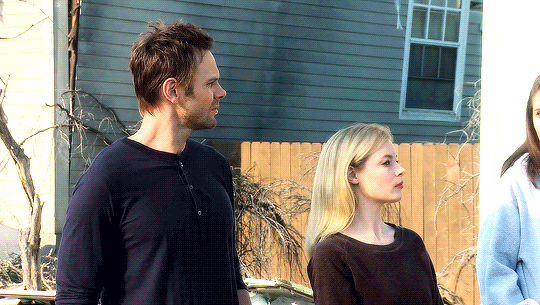
Season 1
Season 1 has a BUNCH of Jeffbritta episodes, specially considering they were supposed to be the main couple of the show back then. My favorites are:
S1 E1 Pilot: Obviously.
S1 E3 Introduction To Film: Seize the day!
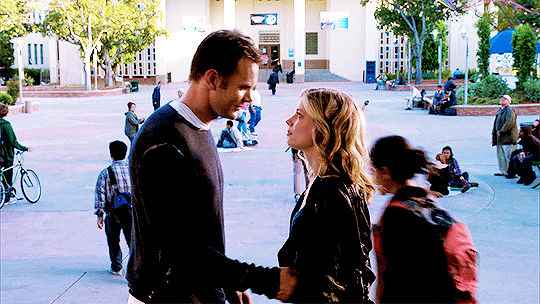
S1 E14 Interpretative Dance: This is the cute episode where Jeff brings flowers for Britta.
S1 E16 Communication Studies: This is the episode where Jeff gets drunk with Abed and ends up calling Britta and blablabla...
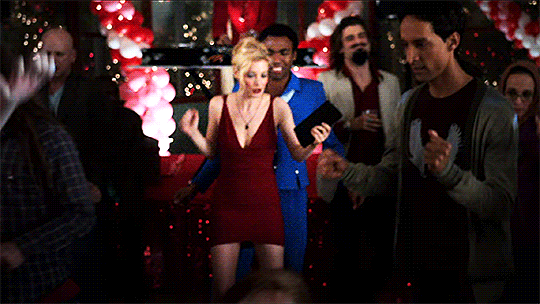
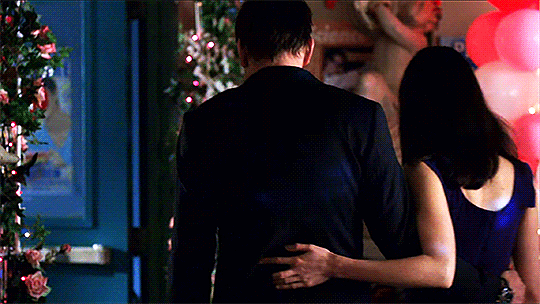
S1 E22 The Art Of Discourse: This one doesn't have any explicit Jeffbritta I think? It's just fun to see them make an evil plan to take revenge on some random highschoolers.
S1 E23 Modern Warfare: One of my (if it isn't my #1 favorite) favorite episodes of Community. The one where Jeff and Britta have sex in the study room table.
Season 2
On Season 2 we got a weirdly amount of Jeffannie episodes, but we still had our fair share of Jeffbritta episodes!
S2 E1 Anthropology 101: Not really Jeffbritta, but it's still fun watching them being gross in this episode, right?...right?
S2 E6 Epidemiology: Seeing Jeff walk around with Britta to give her drinks is funny.
S2 E10 Mixology Certification: This is an obvious one.
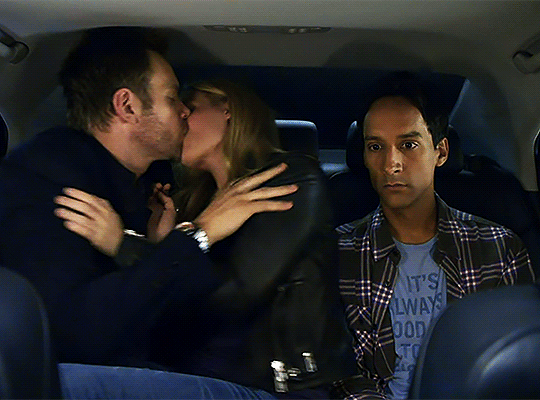
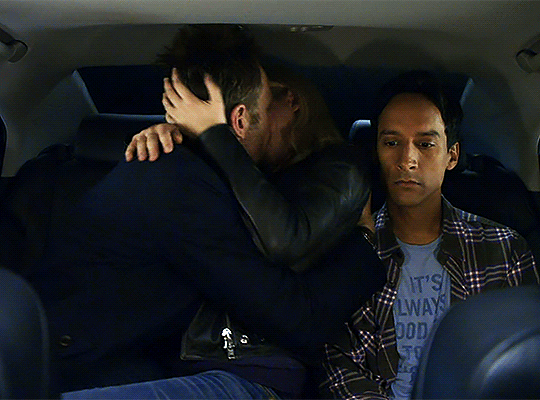
S2 E13 Celebrity Pharmacology: Cool cats. AKA, The Bi Panic™
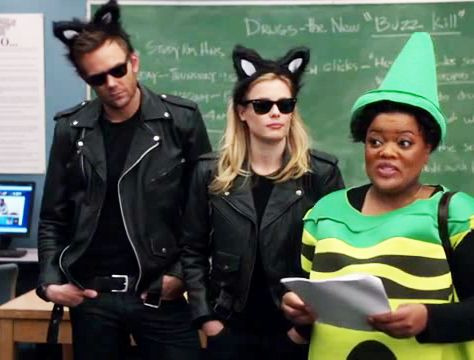
S2 E16 Intermediate Documentary Filmmaking: That's Irak, stupid. WHAT DO I KNOW, I'M JEFF WINGER'S DUMB GAY DAD!
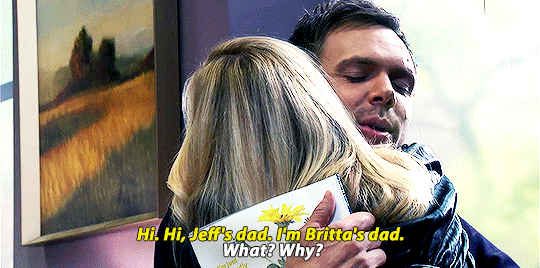
S2 E19 Critical Film Studies: This isn't really a Jeffbritta episode, but they match costumes... that's... that's enough, right
S2 21 Paradigms of Human Memory: Unrelated, but I just looked at the Wikipedia page, and it was almost entirely filmed in Universal Studios. The "popping the back of a raft makes it go faster" scene was filmed in a Jaws set! Anyway, we have the funny Jeffannie sequence, but it's a fun episode if you focus on Jeff and Britta, too.
S2 E22 Applied Anthropology and Culinary Arts: Not a lot of Jeffbritta, but still, fun and cute interactions.
Season 3
S3 E6 Advanced Gay: I love this episode so much, it's so ridiculous at so many levels. Also, Britta adressing Jeff's daddy issues is always fun.
S3 E11 Urban Matrimony and the Sandwich Arts: One of the many times Jeff and Britta almost get married.
S3 E12 Contemporary Impressionists: This is one of my favorites of all the show. It's so funny seeing Jeff be... whatever this is
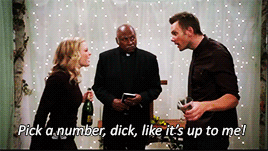
S3 E21 The First Chang Dynasty: GothJeffandBrittaGothJeffandBritta
Season 4
It's amazing how many Jeffbritta moments the gas leak season gave us.
S4 E2 Paranormal Parentage: Again, Britta with Jeff's daddy issues.
S4 E5 Cooperative Escapism in Familial Relations: Britta helping Jeff is heartwarming. SHE'S SO PROUD OF HIM YOU GUYS. Also, them in cars. You can never have enough Jeff and Britta in cars.
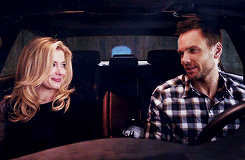
S4 E8 Herstory of Dance: This is also an episode I really like. Jeff and Britta are adorable in this one.
S4 E10 Intro to Knots: Greendale parents.
S4 E12 Heroic Origins: GUYS LOOK THEY MET EACH OTHER BEFORE
Season 5
I love the Jeffbritta episodes here, but at the same time... it's so cruel that they made all this build-up just for a Jeffannie ending. It's like they WANTED to make us suffer. Fuck you, Dan Harmon.
S5 E7 Bondage and Beta Male Sexuality: HE WANTS HER BACK
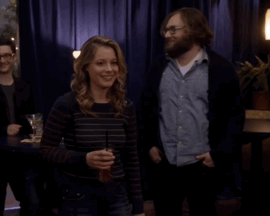
S5 E8 App Development and Condiments: mustard
S5 E12 Basic Story: I cried
S5 E13 Basic Sandwich: I also cried. RAGE TEARS
Season 6
I don't really like watching S6, buuuut I'm gonna say "S6 E6 Basic Email Security" for the short Jeffbritta banter.
...this is it. this took me two days. okay bye
#community#community nbc#nbc community#jeff winger#britta perry#jeffbritta#jeff x britta#britta x jeff#community tv#redstreet#community tv show#community meta#wingamy rants
51 notes
·
View notes
Text
It's actually fascinating to watch Abed's learning process through documentary making. Like in Introduction to Film, obviously Six Candles is very clunky and simple, but it gets the point across. It couldn't not, Abed very rigidly pushes to get that specific story, even if he has to cobble it together from clip art and manufactured conflict. The message is all that matters, because it's the first time he's had the tools to communicate it. It's not even really a documentary, since he can't get more than a little clip of his dad, and nothing of his mom.
And then he's making movies of actors playing his friends. They are shocked by how well he knows them, but I think the process of making the movies is actually his way of studying their behaviour. He is fixated on knowing them as well as he can, because he cares so deeply about them. But they don't get that.
Then Intermediate Documentary Filmmaking, his first real documentary. He assumes the format will be easy, but he learns to have a more balanced view of it. There are points where being a filmmaker clashes with being a friend, and he treats the narrative as more important than people's feelings. But overall, he's obviously not the villain here, and isn't the main target of anyone's anger. Pierce by virtue of having a big ego and no idea how to mess with Abed, accidentally gave him a very useful opportunity.
Documentary Filmmaking: Redux is really interesting, because what Abed is doing is transparently unkind to begin with. He is so caught up in the story that he is willing to watch his friends descend into chaos for it, even ignoring Troy being clearly upset with him. But he ultimately learns that he can't be completely detached, and he chooses to be kind and help the Dean out.
Advanced Documentary Filmmaking has him trying very seriously to investigate something from all angles, and he seems to have more of a grip on recording the truth without being clumsy or insensitive about it. You could argue that there's a moral dilemma in knowing Jeff's true intentions, but I'm pretty sure Abed always saw through Chang's bullshit.
Then Wedding Videography is kind of the polar opposite of Six Candles, in that he's just filming whatever happens, in a situation that holds little personal significance to him. The only thing he insists on is no Jimming the camera. It feels like he is basically using the camera as a barrier for a social situation he doesn't really want to be part of. And not to sound like a stuck record, but he wouldn't be like that if Troy was there. He's gone from using documentaries as a tool to understand and communicate with people, to using it to detach himself. Which I'm not saying is bad in itself. It's a reasonable coping mechanism, it's just sad that he needs it. It's sad that none of his other friends has developed a consistent way to be quite as grounding and make him feel like a participant, not just an observer.
30 notes
·
View notes
Text
Turtles Catches Up With Old GMMTV: I Told Sunset About You (ITSAY) Edition
[What’s going on here? After joining Tumblr and discovering Thai BLs through KinnPorsche in 2022, I began watching GMMTV’s new offerings -- and realized that I had a lot of history to catch up on, to appreciate the more recent works that I was delving into. From tropes to BL frameworks, what we’re watching now hails from somewhere, and I’m learning about Thai BL's history through what I’m calling the Old GMMTV Challenge (OGMMTVC). Starting with recommendations from @absolutebl on their post regarding how GMMTV is correcting for its mistakes with its shows today, I’ve made an expansive list to get me through a condensed history of essential/classic/significant Thai BLs produced by GMMTV and many other BL studios. My watchlist, pasted below, lists what I’ve watched and what’s upcoming, along with the reviews I’ve written so far. Today, in a long post, I work my way through Nadao Bangkok’s cinematic motherlode: ITSAY. Thanks to everyone for your patience with this post: I did major due diligence with it, with the absolutely TREMENDOUS help of @telomeke, @lurkingshan, @wen-kexing-apologist, and @bengiyo to ensure I had facts and analysis correct. Thank you, from the bottom of my heart, to these dear friends for holding me down and offering your sharp eyes.]
To dive into a topic as complicated, as beautiful, as reflective, as impactful as a macro-analysis of I Told Sunset About You is to take on...a lot. As I’ve discussed with @lurkingshan, from a filmmaking perspective, as so many of us who have watched ITSAY know -- it occupies the top spot of Thai BLs by way of pure cinematic quality. (If you follow my late-night liveblogs, you’ll know that this was the first show -- not even Bad Buddy did this to me -- where I needed to stop multitasking, to just sit and watch the episodes. No drama has done that for me in the years since I became a multitasking mom.)
As with 2gether and Still 2gether last week, this watch of ITSAY is a definite milestone on the OGMMTVC list, and I really thank @shortpplfedup, @bengiyo, @wen-kexing-apologist, @lurkingshan, @telomeke, and others in advance for what we’ve talked about in direct conversation regarding ITSAY, its many influential tentacles, and the influences that the show itself may have come from.
I’d like to touch upon a couple of frames to structure this piece, but the caveat here is that by no way will I consider myself an ITSAY expert, because there’s a tremendous fandom that knows much more about the Nadao Bangkok studio, about PP Krit and Billkin Putthipong, about the director and screenwriter, Boss Naruebet, and much more. I will have a substantial postscript to capture loose notes and learnings that didn’t make it into the main analysis.
Inspired in part by direct conversations with @telomeke and @lurkingshan, I’d like to dive into the following:
1) From a question that @lurkingshan posed to me: what shows from the start of the OGMMTVC watchlist -- and, more broadly, what art out there -- do I think spoke to ITSAY and its development, 2) The important story of Chinese migration to locations like Phuket, Penang (in Malaysia), and other locations on the Malay Peninsula, and how Chinese and Thai-Malay-Chinese-Peranakan cultures flavored ITSAY’s storytelling, 3) A discussion of internal and external homophobia on Teh’s experience, and how his conversation with Hoon encapsulated our understanding of homophobia, filial piety, and socioeconomic pressures in Teh’s particular life, timeline, and culture,
and more, I’m sure. Let’s boogie.
I warned some folks prior to this review that my thoughts on what may have spoken to ITSAY may turn some people off, so I offer this as a flare to y’all in advance. Acknowledging that episodes three and four of ITSAY were as emotional as anything I had ever seen in Asian BLs, Teh was just such a PERFECTLY written character. (The ITSAY supporting documentary episodes state that the show was in part inspired by Billkin’s and PP’s personal lives, and I know there’s fanon that the show was meant to deeply depict their personal stories with each other. I don’t have primary source material to point to regarding this, so I’ll leave it alone, with the understanding that there are interpretations of the show that read between the lines to bring that lens in. I acknowledge the existence of the theories, but will not dive into that here.)
So, in regards to Teh, as I chatted with @lurkingshan as I was watching the series, I just kept thinking to myself... hello, Fuse.
CHAOS BOYS! (Fire Boys? No, no, chaos boys, ha.)
This is where I think my analytical read might get a little controversial with folks, because to compare Make It Right to ITSAY -- from a LOOKS perspective, CERTAINLY from a storyline and narrative structure perspective -- no, it’s not there, not by a long shot.
But when I wonder about what ENERGIES and inspirations opened the door for Boss Narubet to WRITE the way that he wrote, and to DIRECT the way that he directed, Teh’s ENTIRE EMOTIONAL PROCESS AND BREAKDOWNS, his back-and-forth, his hesitations -- I saw chaos, and when I think of chaos, I think of Fuse.
I think of Fuse, and how Fuse was held back, particularly in Make It Right 2, regarding Fuse’s CULTURAL AND SOCIAL ASSUMPTION that he couldn’t break up with his girlfriend, all while being in a nascent give-and-take, back-and-forth relationship with Tee. And how that ASSUMPTION held BACK the full expression of commitment, honesty, and trust that Fuse and Tee ended up having at the end of MIR2. Fuse was being rather unsophisticated while he was struggling with this, and he was bringing Tee along, frustratingly, for that ride.
Something that you said to me also really resonated, @bengiyo, in conversation with @lurkingshan, about comparing TeeFuse and TehOh, in that Fuse and Teh weren’t necessarily SPARKLING or GIFTED presences. As you two both pointed out to me: Teh had to work much, much harder than Oh-aew for the talents that Teh achieved, and somehow, chaotically, he managed to lose his grip on those talents and achievements as he gave up his hard-earned opportunities for the sake of the overall-better-off Oh-aew. MESSY, BRO.
Besides MIR/MIR2, there’s somewhere else where I saw chaos. @bengiyo, you pointed out to me that you felt that you saw more of Thai queer cinema in ITSAY than in BL. I don’t think ITSAY *doesn’t* speak to BL and vice versa (I don’t think there’s anyone who thinks that, considering what Nadao Bangkok achieved with this show), but when I think of chaos -- and of the structures of storytelling that allowed us to get such an in-depth experience of Teh -- I also think of 2019′s Dew the Movie, and to a different extent, the before-its-time show in 2019′s He’s Coming To Me.
ITSAY, Dew, and HCTM have:
a) multiple chaotic leads (including actual ghosts and dudes who see ghosts), b) overarching cultural backgrounds rooted in extremely specific Asian cultures and/or practices and/or time periods, and c) interplays of emotional revelations vis à vis those specific cultural backgrounds.
- Fuse introduced to us, way back in 2016 and 2017, an internal holding back of an emotional engagement with Tee that was rooted in internal homophobia by way of his negotiation with what Fuse’s girlfriend expected of him, and what HE expected of HIMSELF regarding HAVING a girlfriend, while falling in love with a young man.
- Dew featured two young men in chaos, in 1990s rural Thailand, one of whom (Dew) who had previously lived in a different city where, likely, his sexual orientation would not have been met with such dystopic scrutiny as it did in the movie. The movie made clear that Dew wanted a solid relationship with Phop, but with both Dew’s and Phop’s families and cultural expectations holding them back, they both met untimely and unfortunate ends that hammered, in extremes, the perils, in cinema, of being gay and out in an incredibly restrictive and old-fashioned Asian society.
- HCTM featured a young man (Thun) who could see ghosts, along with the ghost that he ends up falling in love with (Med). The revelation of Thun’s being able to see Med is deeply connected to Thun’s Thai-Chinese Buddhist practices, and how his family has engaged with spirituality over the course of his life. While the structure of the show has often been described as having a happy ending, I argue the opposite -- that the ending is left open-ended, as it so often is in some of P’Aof Noppharnach’s shows, with the assumed understanding on behalf of an Asian audience that Med will one day be reborn and will leave Thun’s side (unless he’s reborn into another person that knows Thun) (hello, Until We Meet Again).
So what do all of these shows/movies -- ITSAY, Make It Right/MIR2, Dew, and HCTM -- have in common?
ITSAY, Dew, and HCTM have the common background of an old-fashioned culture serving as a MAJOR anchor to their stories. Their stories are leveraged by the micro-level, individual-level interplay between their main characters and old-fashioned worlds, complete with old-fashioned notions, assumptions, and expectations. ITSAY, Dew, and HCTM negotiate boundaries with these cultural guardrails, and we see -- Teh at the end of episode 4, Thun on the rooftop in episode 5, Dew talking to his mother -- what those expectations and boundaries have done internally to our dear young men.
Make It Right’s Fuse, way back in 2016, internalized this slightly differently, without us seeing as deeply the WORLD in which he grew up. The directors and screenwriters New Siwaj and Cheewin Thanamin gave us a guy in school with a girlfriend. FUSE’S world, that we see, is a school world, so apropos for that time of Thai BLs, complete with very heterosexual expectations for a young man WITH a girlfriend. And Fuse struggles with his push-and-pull throughout the two seasons.
What I love about the OGMMTVC project is that by having watched these projects before ITSAY, I can somewhat predict what the journey of chaos, by way of internal revelation, will be for these characters.
However.
What ITSAY DESTROYED for me, as compared to these dramas and movies, was the high level of acting that Billkin leveraged to get Teh to the emotional levels that he reached. Teh, episode 4, and Thun, episode 5 = handshakes.
This is where ITSAY’s structure just brings ITSAY to the top of the cinematic list and runs away from everything else. I posted in my liveblogging that the ending of episode 3 blew me away with a subversion of the four-act structure of screenwriting. @bengiyo corrected me to say that it was, instead, a rare example of Thai BLs achieving a successful five-act structure.
Just -- fuck.
You combine this UTTERLY FUCKING BRILLIANT STORYTELLING STRUCTURE, NARRATIVE STRUCTURING PAR FUCKING EXCELLENCE, ALONG WITH BILLKIN’S PORTRAYAL OF TEH IN HEAT AND CHAOS, and I’m eating, fam. Five-star Michelin tasting menu-level.
But before I start that meal, there’s even more that ITSAY did to really hammer in what I’m referencing by way of the anchors of old-fashioned culture to this story, which, clearly, Boss and Nadao Bangkok value, in the show’s indirect commentary on Chinese culture and migration in Thailand, and what it meant for Teh and Oh-aew to grow up in Phuket and prepare to leave for Bangkok. (If you haven’t watched ITSAY, I highly recommend that you plan on watching the supplementary documentary material, because those docs give a ton of insight into the Thai-Malay-Chinese background of the show. As a SE Asian homey, those revelations gave me the wonderful warm and familiar vibes.)
Dear @telomeke (I don’t know what I’d do without you, friend!) helped me to understand, back in my HCTM days, that I inherently know more about Chinese migration, immigration, and culture into Southeast Asia than I previously gave myself credit for as a part-Malaysian, because many of the migratory patterns and cultural assimilations are similar between Thailand and Malaysia. I appreciated that confirmation, and had my inspector’s hat on during my watch and rewatch of ITSAY.
I’ve spoken with @lurkingshan and @neuroticbookworm about the impact of migration and diasporic existence, in that, I think, oftentimes, immigrants to another country often hold a more conservative view of the cultures they bring with them -- in order to hold onto the tenets of those cultures, and to keep those tenets from getting influenced or maybe even watered down by the new environment in which immigrants are living. (My example to Shan and NBW was that I find that South Asian immigrants are often MORE conservative than my relatives in my homelands -- so as to keep a tight grip on assimilation, or, say, moral/ethical weakening by way of Western culture.)
I think the background of Phuket and EVERYTHING it lent to the show...
- Teh’s mom selling Hokkien mee at a stall storefront and the boys eating it in Teh’s old-fashioned house, - The old-fashioned o-aew dessert shop, selling a Hokkien Chinese dessert, which is often preceded by a shot of the “Phuket Old Town” sign, - Teh’s mom’s traditional Chinese-Peranakan outfits, particularly when she’s celebrating Teh and Hoon’s successes, - The tight streets and alleys,
...all of it, visually and culturally, reminded us that the boys live in a world that was DEEPLY INFLUENCED by the way back when. I posit that Teh’s mom is the encapsulation of this kind of old-fashioned culture, from the architectural style of her Hokkien mee stall, to the clothes she wears, to the heavy decorations and rugs and furniture of her old-fashioned house -- to her old-fashioned notions of filial piety that both her sons will be successful and will help to take care of her as she ages. I posit that this old-fashioned mindset also likely led Teh to believe that Teh’s mom would not accept him for liking men, which I will delve into more in a bit.
I mentioned cultural assimilation earlier: I brought up Penang, Malaysia, earlier, because I’ve spent time in Penang -- and Penang was referenced by Boss in the ITSAY documentaries as being similar to Phuket by way of cultural structure. @telomeke educated me on the tin-trade-influenced links from Phuket to the Malaysian towns of Penang and Kuala Lumpur, all towns that experienced heavy immigration from China and feature the strong presence of Chinese-Malay-Peranakan cultures in their social fabrics. The Peranakan population developed when the first Chinese immigrants to these regions began marrying the local ethnic Thai and Malay residents, creating a brand-new culture, complete with unique foods, clothing, architecture, and much more.
Having not been to Phuket yet, I believe Boss. As well, I want to note -- very important to me as a part-Malaysian -- that Boss referenced Teh’s nickname as the Malay word for tea. @telomeke noted for me this distinction as one that’s notable for how ITSAY differentiates the culture within the show -- again, a culture that’s influenced by Chinese and Malay migratory history -- against the backdrop of Bangkok, where tea is not “teh,” but rather is called “cha,” the Thai word for tea. [The most famous “teh” drink of Malaysia is teh tarik, a sweet, creamy, and strong tea drink that you see everywhere in Malaysia. While o-aew is a distinctly Chinese-style dessert, teh tarik comes from Indian immigrants to Malaysia (and is usually drunk with roti canai, another Indian import to Malaysia)].
In other words: we are talking a TREMENDOUS, a TREMENDOUS amount of references to cultural mixing, development, and assimilation here, all INTENTIONALLY placed by Boss Narubet and his screenwriting team -- and all of this serving as a reflection against what Teh and Oh-aew will experience as being “different” in their futures in Bangkok, where this Thai-Chinese-Malay cultural differential will make them different when they get to college. (Not having seen I Promised You The Moon yet, I wonder if IPYTM sets up Teh and Oh-aew as potential country mice, à la Ji Hyun and Joon Pyo in The Eighth Sense.)
One more pertinent note of cultural intermixing by way of the historical Thai-Chinese-Malay linkages. @bengiyo was surprised that I didn’t initially exclaim at the presence of hijab- and songkok-clad Muslim women and men eating at Teh’s mom’s Hokkien mee stall; Teh and Oh-aew’s friend, Phillip, is also shown with his Muslim parents. It’s funny, @bengiyo, as I said to you: because I was watching ITSAY with such a trained eye towards spotting the Thai-Chinese-Malay cultural mixing, seeing Muslims on screen did NOT ring a bell of differentials because -- I expect to see them there, in those kinds of spaces, anyway. (In fact, seeing Muslims on Thai television is rare, which I will get into more in the postscript.)
So we have: MANY CULTURES MIXING OVER MANY GENERATIONS. Migratory patterns intertwining. Indications of physical and emotional movement. And even though, and even DESPITE, these cultures mixing, we ALSO HAVE an OVERARCHING message of old-fashioned customs and ways of living that dominate the lives of the children in the show -- ESPECIALLY Teh. Teh and Oh-aew -- literally, their NAMES reference places ELSEWHERE than Phuket and Thailand. Phuket’s old-fashioned roots. Teh’s mom SELLS a dish that comes from somewhere else (the Hokkien Chinese population mostly hails from Fujian, China, as its origin).
What happens with migration and immigration? Cultures collide and combine -- social mores and expectations change -- one’s standards of HOW TO LIVE ONE’S LIFE changes.
Teh and Oh-aew, during the entire series, are facing a moment in time where THEIR lives, THEIR cultures, THEIR micro-interactions WITH THEIR cultures, ARE GOING TO CHANGE, definitively, by way of their burgeoning same-sex relationship. Teh and Oh-aew are already different in Thailand by way of their cultural backgrounds, as I’ve established -- and now, with a potential public revelation of their relationship, will they be even more different. And their families -- especially Teh’s mom, but Oh-aew’s family as well -- are going to collide with the very PRESENT present vis à vis their boys and their love.
As this happens with migration and immigration, CHANGE WILL HAPPEN vis à vis Teh and Oh-aew’s queer revelations as well.
Boss focused on the aspects of Phuket that were anchors to the culture that Teh and Oh-aew were raised in -- an immigrant culture, a migrant culture from China, that has had a long hold over many, many towns and societies in Thailand. We didn’t see the modern 7-11s that we know are there in Phuket, serving the tourists of these towns.
And, just like the physical dystopia of Dew, and even vis à vis the spiritual practices built into He’s Coming To Me, the slice of Old Town Phuket that we SAW as that anchor was a HEAVY PRESENCE in Teh’s life -- it was PERFECTLY matched with the old-fashioned, conservative ANGER and DISAPPOINTMENT that we saw in Teh’s mom in episode 4, when Teh shares that he dropped out of university for Oh-aew. That anchor, to me, was meant to SMASH into, FEED into Teh’s overwhelming emotionality at his queer revelation, and at the revelation that serving his mother via filial piety would be automatically made more difficult, thus maximizing the impact of his internalized homophobia and his fear of recognizing his love and attraction for Oh-aew.
COUPLE THAT with the previous hints -- and then the SMASHING WRECKING BALL -- of the visual depths of Oh-aew’s own realizations earlier in episode 4, his own internally different place, the way he reveals himself to the world vis à vis the fast Instagram post of him wearing the red bra. And how Teh reacts to it. And how it sets off such an unreal chain of emotional unraveling for Teh, the SECOND of that episode, even before he goes to Bangkok to drop out.
WHOA.
THIS, TO ME WAS FUCKING STUNNING
and very important to me to see as a South/Southeast Asian. WHEW.
And, good lord. How Hoon comes in at the end for Teh. Hoon, the eldest son, the one who has very quietly borne the financial responsibility that his mom, Teh’s mom, too, has placed on Hoon’s shoulders, naturally, through generations of family custom. (Super duper thanks to @lurkingshan for talking me through this in detail with me.)
And Hoon gives his family, his little bro, Teh, comfort. How Hoon says, listen. Mom’s gonna be mad if and when you tell her about Oh-aew and your feelings for me. But guess what? She’s gonna come around. You’re a crybaby, Teh, but I’m here for you.
Hoon knows that Teh’s mom will come around -- because Hoon is also a part of the next generation of change, much like his Thai-Malay-Chinese-Peranakan community before him -- as he brings his Japanese girlfriend home to his mother and brother. (THANK YOU, @wen-kexing-apologist, for pointing this out!)
Teh’s mom, too, will move. She will move from her old-fashioned mindset, to migrate to a new mindset, where she will accept her son. Teh needed to hear that, to know that that movement would be possible.
Just like the movement of the many swirling cultures around Teh and Oh-aew, the hustle of Bangkok before them, nipping at their lives like the ocean to the beach.
What ITSAY captured for me was a cinematic moment of movement on so many levels. It was a pulsating reflection of change. It was meant and designed to insidiously shock viewers out of complacency. Like a beanstalk climbing from the ground, the movement begot movement to these two young men beginning to address and empty themselves of the homophobia that kept them back, Teh especially.
GAH, THEIR MOVING PHYSICALITY, IT NEVER STOPPED -- the end of episode 2 on the boat, the end of episode 3 in Teh’s room, GAWD -- Teh’s ABSOLUTE HORMONAL DRUNKENNESS, Oh-aew’s STARE AFTER STARE AFTER STARE, Oh-aew’s SILENT DEVASTATION AT THE END OF EPISODE 3, the way Teh would nod and FLOP his head uncontrollably in desire, the nuzzles, the sniffs, the uncontrolled reaches -- GAH. It gives me the shivers.
It was a lot.
ITSAY was just -- y’all know it. It was fantastic. While HCTM was before its time, I feel that ITSAY was RIGHT ON TIME. It brought so many elements of this GORGEOUS, HISTORIC, culturally Southeast Asian experience into the intersection of the queer lens, as well as the *migratory* lens of the Southeast Asian region specifically. It showed us, from a micro-perspective, the very tremendous macro-level implications and pressures of filial piety, of internalized homophobia, of the huge socioeconomic expectations that families have on Asian students to succeed in education, and so much more. IT WAS *DEFINITIVELY INTERSECTIONAL*, MORE SO THAN ANY BL BEFORE ITS TIME.
Yet again, for me, just like Bad Buddy, just like Until We Meet Again, I have another show in my arsenal that makes me proud to be an Asian watching these shows -- and in ITSAY, I feel particularly proud that a slice of my own personal culture, as an Malaysian, made it in there, intentionally. I will FOREVER, and ever, be grateful to ITSAY for that.
-------
I’d like to offer this postscript as a means of making some quick points that @telomeke, @bengiyo, @lurkingshan, and @wen-kexing-apologist shared with me as I was writing this review -- and I thank them all deeply for reading drafts of this post before publication.
1) I was previously unaware of the history and current state of Islamic culture in Thailand until ITSAY and Be My Favorite included women wearing hijabs in their shows. This is an important slice of culture for me to know about, as I’m part-Malaysian, where Islam is the dominant religion. @telomeke shared with me that the majority Muslim population in Thailand is in southern Thailand (although, of course, Muslims live across Thailand), and that there have historically been separatist efforts in those southern provinces that have often led to violence.
There are many reasons why discrimination of Muslims exist in Thailand, as it does around the world, including references to the separatist efforts in the southern provinces. As well, ethnic Thais can trace their heritage back to various towns and communities within China, thus possibly making northern Thailand, with its proximity to China, potentially more lauded in Thai culture, and contributing even more to a perception that southern Thailand, with its Muslim population, as potentially “less desirable.” (And I want to take a second to note @telomeke‘s excellent point to me that “Chinese” as a catch-all word is often incomplete, as Han Chinese make up a sizable portion of Thailand’s population, but as we see in ITSAY, the Hokkien Chinese population also flourishes in certain parts of the country, and there are populations of Teochew and Hakka Chinese as well, as there are in Malaysia.)
All of this combined -- the geographic proximities to China, the places where various populations have settled, from the places that various populations of Thais track their heritages, plus global and/or popular misconceptions and stereotypes of “other” communities -- can contribute to discrimination of Muslims in Thailand. Of course, that is not a universal statement, as we do see Muslims beginning to show up in Thai drama art, which is heartening. To me, it strikes me as more realistic for the region to see Muslims on screen, but I don’t know Thailand well enough to say that for sure (that’s my Malaysian-side talking). I really want to thank @telomeke for taking me on SUCH a deep dive with insight into this part of Thai culture that I think is very necessary and fascinating. (Politics in Thailand is quite complicated at the moment, but at this very second, Thailand’s current Parliament speaker, from the Move Forward party, is Thai Muslim, with a Malay Muslim name -- Wan Muhamed Noor Matha. Very cool, but this is going to change soon, as Move Forward will make way for another political party to take control of the government.)
2) If you know me well enough, I cannot leave food well enough alone in our wonderful dramas (exhibit A: Moonlight Chicken and khao man gai, exhibit B: coffee/kopi in The Promise, lol), and I want to make sure that we were all aware back in 2020, and/or make you aware now, that Hokkien mee is a VERY regional dish, with styles unique to each town in which it is famous. @telomeke, I know you feel differently, but Hokkien mee from Kuala Lumpur (KL), Malaysia is my.... it’s my heaven, my soul, my heart, HA!
Here’s some linkies to get you educated. And also! Oh-aew prefers his Hokkien mee with rice vermicelli noodles, instead of the usual, thicker egg noodles. You know what I like to do if I see that a stall has the two styles of noodles available: I like to get them mixed together. Hokkien mee, Hokkien prawn mee noodle soup, curry laksa -- I like the best of both worlds of noodles in my bowl. YUM.
Phuket Hokkien mee KL Hokkien mee Penang Hokkien mee (this one is the prawn noodle soup, not the fried noodles -- omfg so good) Singapore Hokkien mee (note the lighter color -- and the m’fing mix of thick and thin noodles, hell yeah!)
(If you made it this far in the ITSAY review, I have an easter egg for you. Guess what the Malay name is for rice vermicelli noodles? Bee hoon or mee hoon.
Hoon and Teh, two Malay names: thin noodles and tea. What Teh’s mom serves at her stall, and what Teh and Oh-aew represent, symbolically, by names and their noodle preferences, as a pairing. AND! @telomeke gave me one more easter egg! Teh O is a popular way to order tea in Malaysia and Singapore. It’s black tea with sugar, no milk. Another pairing reference. ITSAY never stopped with all the layered references!)
[WHEW! What a ride. Thanks to all y’all who held me down during my losing-it liveblogging of ITSAY. More to come when I get to Last Twilight in Phuket and I Promised You The Moon.
Next week, I’ll release my review of YYY into the wild -- listen, honestly. Yes, chaos, confusion, all of it. But I am not writing this show totally off. There was definitely stuff in it to chew on. And: POPPY RATCHAPONG. And Pee Peerawich. The acting was actually stacked on this show. There’s stuff! More soon.
And I also finished Manner of Death, so that review will drop in two weeks. I LOVE MAXTUL. UNABASHEDLY. Yes, I know I’m years late, yes, I know Tul is retired, sobs. Let me live my 2021 dreams! These guys are so good together, and MoD was fuckin’ great.
I have so much good stuff on the way: I’m fully in my ATOTS rewatch, and I’ve added 55:15 Never Too Late, very specifically its BL storyline. I may not give 55:15 a full review because I’ll fast-watch the rest of it, but: Khao, come to me, boo-boo! I have an INSANE August ahead of me as I’ll be moving in a month (GAH), but hopefully this schedule won’t fall back too much.
Status of the listy! Hit me up if you have feedback!
1) Love Sick and Love Sick 2 (2014 and 2015) (review here) 2) Make It Right (2016) (review here) 3) SOTUS (2016-2017) (review here) 4) Make It Right 2 (2017) (review here) 5) Together With Me (2017) (review here) 6) SOTUS S/Our Skyy x SOTUS (2017-2018) (review here) 7) Love By Chance (2018) (review here) 8) Kiss Me Again: PeteKao cuts (2018) (no review) 9) He’s Coming To Me (2019) (review here) 10) Dark Blue Kiss (2019) and Our Skyy x Kiss Me Again (2018) (review here) 11) TharnType (2019-2020) (review here) 12) Senior Secret Love: Puppy Honey (OffGun BL cuts) (2016 and 2017) (no review) 13) Theory of Love (2019) (review here) 14) 3 Will Be Free (2019) (not a BL or an official part of the OGMMTVC watchlist, but an important harbinger of things to come in 2019 and beyond re: Jojo Tichakorn pushing queer content in non-BLs) (review here) 15) Dew the Movie (2019) (review here) 16) Until We Meet Again (2019-2020) (review here) 17) 2gether (2020) and Still 2gether (2020) (review here) 18) I Told Sunset About You (2020) 19) YYY (2020, out of chronological order) (review coming) 20) Manner of Death (2020-2021) (not a true BL, but a MaxTul queer/gay romance set within a genre-based show that likely influenced Not Me and KinnPorsche) (review coming) 21) A Tale of Thousand Stars (2021) (review here) 22) A Tale of Thousand Stars (2021) OGMMTVC Fastest Rewatch Known To Humankind For The Sake Of Rewatching Our Skyy 2 x BBS x ATOTS (watching) 23) Lovely Writer (2021) 24) Last Twilight in Phuket (2021) (the mini-special before IPYTM) 25) I Promised You the Moon (2021) 26) Not Me (2021-2022) 27) Bad Buddy (2021-2022) (thesis here) 28) 55:15 Never Too Late (2021-2022) (not a BL, but a GMMTV drama that features a macro BL storyline about shipper culture and the BL industry) 29) Bad Buddy (2021-2022) and Our Skyy 2 x BBS x ATOTS (2023) OGMMTVC Rewatch 30) Secret Crush On You (2022) [watching for Cheewin’s trajectory of studying queer joy from Make It Right (high school), to SCOY (college), to Bed Friend (working adults)] 31) KinnPorsche (2022) (tag here) 32) KinnPorsche (2022) OGMMTVC Fastest Rewatch Known To Humankind For The Sake of Re-Analyzing the KP Cultural Zeitgeist 33) The Eclipse (2022) (tag here) 34) GAP (2022-2023) (Thailand’s first GL) 35) My School President (2022-2023) and Our Skyy 2 x My School President (2023) 36) Moonlight Chicken (2023) (tag here) 37) Bed Friend (2023) (tag here) (Cheewin’s latest show, depicting a queer joy journey among working adults)]
#i told sunset about you#i told sunset about you meta#itsay#itsay meta#tehoh#teh x oh aew#teh x oh#oh x teh#oh aew x teh#billkin putthipong#pp krit#boss naruebet#nadao bangkok#chinese migration to thailand#chinese migration to the malay peninsula#history of the peranakans#peranakan#peranakans#hokkien mee#muslim population in thailand#turtles catches up with old gmmtv#turtles catches up with thai BLs#turtles catches up with the essential BLs#the old gmmtv challenge#ogmmtvc
122 notes
·
View notes
Text
“Born to Trinidadian parents Claude and Vida Martin in Lewisham Hospital, London, in 1952, Henry Martin returned to the island at three months old to spend his formative years in the heady climate of Carnival culture in the capital city, Port of Spain. Across the street from his home in the Woodbrook neighborhood was the legendary Little Carib Theatre. This hub of cultural activity drew into its orbit everyone from Nobel Laureate Derek Walcott to dance pioneer Katherine Dunham, and the great African American singer/activist, Paul Robeson. Also nearby was the pan-yard of the equally legendary Invaders Steel Orchestra. It was in between those spaces of cultural activism that he would develop his political and artistic sensibility in advance of his return to England in the very early 1970s. He returned already a pan-Africanist, but one who had discovered that ideology as much in the anti-colonial street culture of Port of Spain as in the zones between theatre and pan-yard. His experiences with film in the Caribbean had taught him the power of the moving image. This led him to study film at the West Surrey College of Art and Design. There he committed himself to bringing Afro-Caribbean street culture and politics into film, a mix he believed could be revolutionary. His first film expressed that Trinidadian influence, a short documentary for the Arts Council of London called Grove Carnival (1981). Without dialogue it told the story of a day in the life of the Black community as it prepared for the Notting Hill festival. But like his colleagues in Ceddo, his work was also made in response to the almost annual series of riots that had rocked England since 1976. That first film would inspire his next, the controversial documentary on the militant music and culture of Ladbroke Grove, Grove Music (1981). It was a community he’d become a part of, the late night shebeens, the squats, the hustlers, and revolutionaries. That was why the film featured local musical legends Aswad, and the Sons of Jah. It remained Martin’s favorite of his films. He felt it enabled Black people to finally speak honestly about their interactions with the police as well as express unfiltered views of their lives in England. However, the honesty that the film portrayed would lay the foundation for why he would eventually abandon filmmaking. Despite the enthusiasm of viewers and the fact that the very influential Channel Four bought the film, its release and advertising was so limited as to effectively ban it. It seemed to Martin and his comrades in Kuumba that this was due to the allegation by theater owners and others in the film industry that Grove Music affirmed and encouraged the violent confrontations between racist police and the Black community. This charge was not unfamiliar, having been made against many of the early films of Shabazz and Bakari, and later, in relation to Ceddo’s, The People’s Account. As well as documenting lived realities, these films had in fact been made to document the police harassment and violence towards Black people that instigated the uprisings in the first place.”
Louis Chude-Sokei - Black British Film Pioneer Henry G. Martin: An Obituary (2022)
4 notes
·
View notes
Text
Reality shifts dramatically as 'Osmosis Jones' becomes a groundbreaking success, transforming animation forever.
"The blend of live-action and animation revolutionized filmmaking," a critic explains. "It won both Best Animated Feature and Visual Effects Oscars."
The cultural impact resonates through entertainment. The success influenced how studios approach educational content.
"The way they made biology fun changed science education," a teacher shares. "Every school uses it now."
Modern animation shows its lasting influence. The balance of education and entertainment became industry standard.
"The sequel trilogy was amazing," someone notes. "And the Netflix series about the immune system fighting COVID was groundbreaking."
The franchise evolved thoughtfully with both films and educational content.
"Medical schools use the advanced version in their curriculum," a professor mentions. "It makes complex biology concepts accessible."
You notice how different educational media developed. The show's success created a new genre of entertaining education.
"Bill Murray came back for all the sequels," a fan shares. "His chemistry with Chris Rock just got better."
The franchise's influence spread far beyond entertainment.
"The educational gaming division is incredible," a developer shares. "The Osmosis Jones VR series makes you feel like you're really inside the body."
Theme parks evolved differently.
"The Body Adventure at Universal Studios is amazing," a tourist notes. "The interactive immune system ride is always packed."
Scientific communication transformed.
"Every medical documentary uses their style now," a producer explains. "They made microscopic biology exciting."
Merchandising took unique directions.
"The action figures are in every science classroom," a teacher mentions. "Kids collect different cell types and antibodies."
The impact on public health awareness is notable.
"During the pandemic, they released free educational content," a health official shares. "Their COVID-19 special helped people understand virus transmission."
Animation technology advanced differently.
"The cell-rendering software they developed changed everything," an animator notes. "Even Marvel uses it for their quantum realm scenes."
2 notes
·
View notes
Note
hi! what do you think are the best/most tolerable episodes in season 4 of community? it’s widely regarded as the worst season and I never know which episodes to watch each time I go through a community rewatch binge lol. so, I figured I would consult the encyclopedia! (this is my first time using the ask feature so I apologize if I am not using it correctly)
heyo! this is a great question. I actually have an abbreviated season 4 watchlist that cuts out the worst episodes (in my opinion), while staying comprehensible and making sure you're still able to follow the season's overarching plots:
4x01: history 101
4x03: conventions of space and time*
4x05: cooperative escapism in familial relations*
4x06: advanced documentary filmmaking
4x08: herstory of dance
4x11: basic human anatomy*
4x12: heroic origins*
4x13: advanced introduction to finality
the episodes with asterisks* are the ones I actually really enjoy watching. the others on the list are pretty mid, but are, in my opinion, important enough to the overarching plot and character development to be worth watching. when I'm showing other people season 4 for the first time, I adhere to this watchlist lol.
I’m going to do some (hopefully quick) explanations of how I came up with this list, but you don't have to read it if you don't want to lol:
✅ history 101: it's the first episode of the season, so it really does set the tone and establish some important details (jeff wants to graduate early, troy and britta are dating, this is their last year at greendale, etc.) as with most of season 4, the weirdness seems really contrived and unnatural, but it does have its moments of being genuinely funny. it's also a pretty abed-centric episode, which is always a bonus lol
❌ paranormal parentage: I don’t hate this episode, but it's just kind of boring and doesn't really add anything to the season. I love megan ganz but... yeah. a lot of the jokes seem forced, and there's way too much pierce for my liking. there are a couple good one liners ("you should probably tell your boyfriend's boyfriend" "I remember when this show was about community college") and it does help set up jeff finally contacting his dad, but imo it doesn't quite make the episode worth watching
✅ conventions of space and time: I’ve heard that some people hate this episode? couldn't be me. way too much trobed for me to hate it lmao. there is a lot of jeffannie in it too, but that resolves with the conclusion that annie is just a romantic who loves to fantasize, and doesn't actually have real feelings for jeff. it actually fuels my lesbiannie agenda tbh, because she is evidently just in love with the idea of a man but doesn't actually put that into practice. but that's another post lmao. we have some great one-liners, we have britta helping troy through his jealousy, we have "troy will find me :)" we have some more inspector spacetime lore, etc etc. I love this episode and rewatch it frequently.
❌ alternative history of the german invasion: for me, this episode has almost zero redeeming qualities. the jokes are lame, I hate professor cornwallis, there is so much discontinuity, it has zero importance in the bigger picture of the season and the show, it's out of character, etc. the one thing I like is the end tag.
✅ cooperative escapism in familial relations: this is a big one for me. I never see people talking about it, but to me this episode is one of season 4's saviors. we have HUGE jeff development, jeffbritta moments, some much needed shirley screentime and development, some great jokes ("-to eat garbage dip WHY DID I HAVE TO GO THIRD), classic trobedison shenanigans, and the shawshank redemption homage is very funny to me. plus! adam devine cameo! I like this episode more every time I watch it. unsung hero fr.
✅ advanced documentary filmmaking: okay so I won’t lie, I fucking HATE the changnesia arc. I think it is so incredibly stupid and uncreative. there are a million different and better ways they could have brought him back. but, this episode is just too important in the season's development to skip. and, honestly, if I ignore the whole premise, there are a lot of funny bits and jokes in this one. troy constantly smiling at the camera (read: smiling at abed), troy and annie being the silliest ever, jeff's trust issues, and ken jeong is truly very funny, I just hate this arc so much. but ultimately it's too important to cut. imo.
❌ economics of marine biology: I basically feel the same about this one as I do about alternative history of the german invasion. it's boring, the premise is stupid, it's out of character, it's unfunny, the guest character is lame, and it's pointless to the overall plot. abed and the delta cubes is a little bit funny? and I guess you could argue that the jeff and pierce development is important? but I’d refute that very quickly. it's pierce, who cares. not. worth. it.
✅ herstory of dance: this episode is honestly the upper end of mid, but it has enough good jokes and development to make it worth it. it is also Very abed-centric, which we've established is always a plus imo, and his whole bit with going on two dates at once is very in character. he also meets rachel, who comes back in season 5, so that's important. it also has some great jeff & britta development!!! which is sort of few and far between in the later seasons!!! yippee!!!
❌ intro to felt surrogacy: tied for my least favorite community episode of all time. it's clear they tried to do something similar to what they did with abed's uncontrollable christmas, but it is so incredibly contrived that it is physically painful to watch. I hate the puppets. the hot air balloon story is so stupid and out of character. the songs are bad. how dare they sully the legacy of my third favorite episode (lmao). the only redeeming qualities are troy as a whole (all of his lines are good, and that moment when he pretends his puppet is falling asleep is very funny), and the fact that pierce is not physically in it. but those do not make up for how horrific the rest of it is. in my opinion. haha.
❌ intro to knots: once again! Tied For My Least Favorite Community Episode! they're right next to each other, how convenient. and again: bad jokes, bad premise, I fucking hate professor cornwallis, the changnesia shit is back, the plot is ALL over the place, there is little to no actual character development, the dialogue just goes in circles, and it ends with a random litter of kittens that are never mentioned again??? I guess the only mildly important thing is the end tag with the evil study group, which comes back during the season finale. but yeah. not worth it. disgusting.
✅ basic human anatomy: and here we have a HUGE jump from the last one. this is my favorite season 4 episode, and is probably in my top 15 from the entire show. I could talk about this episode for hours. the troy development alone is so so so good and important. add abed into the mix and Oh Boy!!! britta is great in this one, jeff and the dean's whole thing is so fucking funny, shirley and annie competing against leonard for valedictorian on a technicality is very in character and silly, danny and donald's acting in this one is commendable, etc etc etc. there really isn't much, if anything, I dislike about this episode. jim rash being the credited writer makes me love him even more. legendary. outstanding.
✅ heroic origins: I actually really like this episode. it does still have that sort of unnatural and off-putting vibe that the majority of season 4 has, but I think it holds up. it's in character, it has some great jokes and one-liners, and although it does have its moments of discontinuity, it does a surprisingly good job of staying compliant with what has already been established. certainly much better than alternative history of the german invasion. abed's whole bit with the star wars prequels makes me laugh, the annie's boobs lore, footage of annie and troy in high school (surprisingly well done if you ignore the discontinuity of troy's injury), etc. it's also massively important for the overarching season plot, and we finally get to the conclusion of the stupid changnesia arc. I could go on and on, there's just a ton of really cool callbacks (including one to the pilot, which I only noticed a few months ago and am obsessed with), and I just. wasn't expecting this one to work out as well as it did. pleasantly surprised, all in all.
✅ advanced introduction to finality: this one is not great tbh, but it's too important plot-wise to skip. and, I mean, it does have some good moments. abed immediately recognizing evil jeff, the whole thing being in jeff's head a la remedial chaos all being in abed's head (insert something about how this being yet another demonstration of how fundamentally jeff and abed understand each other, which I could expand way more on but won't in this particular post), season 2 of the cape, "one of us is out of bullets" "is it you" "...yeah" "why would you tell me that," and more. overall, yeah, worth watching imo.
I do also want to say that I think season 4 is a bit overhated. I do agree that it is the worst season, I think most of us can agree that that is an objective truth, but it does have its moments and I do get slightly frustrated when people write the entire season off.
I’m also happy to hear anyone else's opinions on what you think is/isn't worth watching in season 4, especially if you really strongly disagree with me. I’m curious to what your reasoning is lmao.
okay! this is definitely way more elaboration than you needed, but I hope this was helpful 💯💯💯
#sorry again for the long wait on a response#thank you for your patience :)#community#nbc community#community nbc#media analysis#community encyclopedia
32 notes
·
View notes
Text
Psych x Community ??
I love psych and i love community so this vague concept of them existing in the same universe has been floating around in my head.
The key connecting factor being the references to Shawn/Britta’s similarly eclectic off-screen pasts. They're close in age so I'm like okay - it would totally be possible for them to have known eachother/dated/whatever at some point before.
psych aired from 2006 - 2014; Shawn born 1977
community aired from 2009 -2014; Britta born 1980
(Take these two quotes just as an example but it's referenced casually throughout both shows)
Britta’s Dad: I mean, every time we get too close, you run off. We sent you a birthday card to your apartment in New York, and the next week you’re setting fire to a Jamba Juice in San Jose.
Britta: How long is that gonna stick with me?
Britta’s Mom: Until arson is legal, sweetie.
Gus: Shawn, you’ve had fifty-seven jobs since we left high school.
Shawn: Yes I have. And they were all fun. But this one takes the cake.
Gus: Oh yeah? Better than the acupuncture clinic?
Shawn: I didn’t realize experience was necessary.
Gus: What about the summer you spent driving the weiner mobile?
Shawn: I did that for the hot dogs.
I think they fit somewhere in the ballpark of each other's types, both sluts(affectionate) and it makes sense for them to have crossed paths at some point during Britta's “anhercists” days.
So that establishes a link between the groups, but what would it be like if they interacted? Take the arbitrary scenario; Shawn and Gus have gotten themselves and by extension the SBPD into another whacky shenanigan somehow who cares how i'm not writing this
I imagine initially everyone in the study group has a more or less positive impression of Shawn because he's charming, (with the notable exception of…you got it! Jeff)
JEFF
In typical jeff fashion is immediately threatened by Shawn because he has to be the coolestmostlikeabledude™ in the room at all times while simultaneously has to act like he doesn't care so he's quietly seething and - hey what's this new dude doing here making all my friends laugh that's my job! i must now make it my life's mission to prove this guys a fraud and reclaim my status no matter how much a fool i make of myself in the process (a la: advanced documentary filmmaking)
BRITTA
Normal standard “hey old friend” situation, remember when we *insane thing involving multiple felonies and property destruction* haha anyway let me introduce you to my friends -
ANNIE
immediate skepticism that Shawn is able to sidestep pretty quickly by being charming/flirty (NOT in a gross way *hisses at the jeffannie shippers*) Her reaction being like when the dean “swaps bodies with jeff” or after abed’s don draper impression.
ABED
Knows Shawn isn't really psychic but goes along with it/doesn’t point out that Shawn’s hyper observant because he's invested in watching the psychic/cop show formula play out. He would! and I would too!
(quote from 5x03 Basic Intergluteal Numismatics):
Abed Nadir: [Pretending to read the crime scenes as a psychic] I see a man... using a social disorder as a procedural device. Wait, wait, wait, I see another man. Mildly autistic super detectives everywhere.
TROY
Obligatory: “you’re wrinkling my brain right now” and just general fascination, awe, and wonderment. Asks Shawn to tell him his future
SHIRLEY
Immediate judgment on Shawn's practices not being christian enough for her standards, but easily swayed to liking him once he picks up on something and comments on her ex husband being an idiot to lose her or something
PEIRCE
Does his peirce thing and tries to seem impressive and fails, something level five laser lotus blah blah - u get it thats enough on him
THE DEAN
Is facilitating the psych crew being there because it might bring in good press for greendale and he def does the hand on shoulder thing when he meets him you know the one - omg and totally is into Lassiter furrowed brows “im packing heat” Carlton, please. – lassie is Not Amused™
CHANG
This depends on what point in community canon this interaction takes place because season 1 chang would prob be normal(for him), but like season 5 Chang would do/say something so insane and so chang that i can't even come up with it
As for our psych guys, Gus points out how weird and fucked up and bizarre Greendale is meanwhile Shawn is LIVING for it - signs them up for the Dean’s PA announcements class, and “Gus! buddy! I hope you don't mind. I used your credit card to sign us up for The History of Ice Cream. Come on, it starts in 20 minutes ! :D” Gus: “Shawn! >:0”
Lassie would just nonstop point out all the health and safety violations- he doesn't want to be here- calls a lot of people hippies, generally grumpy demeanor and we love him for it.
Starburns terribly hits on Jules - gets rejected, proceeds to try and sell her drugs - gets arrested.
#community tv#psych tv#community x psych crossover#community nbc#psych usa#shawn spencer#burton gus guster#britta perry#the study group#crossover#community show#insane ramblings of a tv obsessed loser#if i had any ability to write entertaining comedic fiction i would#shawn solves the mystery and saves the day#he finds russell borchert years before Basic Sandwich
37 notes
·
View notes
Text

Favorite New-to-me Films—June ‘24
(listed in order pictured above, L to R)
READ on BELOW the JUMP!
The White Moth (1924)
[letterboxd | imdb]
Synopsis: Mona (Barbara La Marr), an American girl in Paris, attempts to throw herself into the Seine. She is rescued by the famous dancer Gonzalo Montrez (Charles de Rochefort), who gives her a job in his new act, where she will dance as The White Moth. Mona is a massive success and attracts the attention of the young, handsome, and wealthy Doug Morley (Ben Lyon). Unfortunately, Doug is already engaged to a society girl. As a solution, Doug’s brother, Vantine (Conway Tearle), whisks Mona away and marries her himself. Vantine is a cynical middle-aged bachelor and fails to see that Mona is genuinely in love with him. Hard feelings ensue.
The White Moth is an engaging and outrageous melodrama. I’ve become a big fan of Barbara La Marr over the years and this film illustrates her strong talent for pantomime. La Marr’s life and career were tragically short, and I wish she had had the chance to do more comedy. Aside from La Marr, a highlight of The White Moth is Mona’s rival, played by Josie Sedgwick. To my knowledge this is the first movie I’ve ever seen her in, but Sedgwick matches La Marr’s energy perfectly and the movie could only have been improved if they had shared more screen time!
——— ——— ———
Ritual Clowns (1988)
[letterboxd]
This short documentary by artist and filmmaker Victor Masayesva Jr. focuses on the traditional roles of Hopi clowns. Ritual Clowns is richly interwoven conversation about indigenous knowledge and colonizer “knowledge.” Masayesva’s layer cake of video footage, graphic art, animation, music, and voice-over is inventive, educative, and entertaining. I’m really looking forward to watching/reading more of Masayesva’s work!
——— ——— ———
Trip to Mars (1924)
[letterboxd | imdb]
Synopsis: Max plans on sending Ko-Ko off to Mars and Ko-Ko is less than enthused. Ko-ko plots his revenge in advance and so both Ko-Ko and Max end up hurtling through space.
Whenever I recommend an “Out of the Inkwell” short in these round-ups, I’m never sure how hard of a sell is needed! In my experience, Fleischer cartoons are usually crowd-pleasers (even in the 2020s) and the OOTI shorts rarely disappoint. Anyway, Max and Ko-Ko riding back to earth together was adorable.
——— ——— ———
Righting Wrongs / 執法先鋒 (1986)
[letterboxd | imdb]
Synopsis: A crusading lawyer (Yuen Biao) turns vigilante and uncovers a troublingly deep collusion between organized crime and the criminal justice system in Hong Kong. A dedicated cop (Cynthia Rothrock) earnestly trying to do her job, discovers the lawyer’s double life and has to confront the corruption of the system she believes in.
Honestly, no short synopsis can capture how much goes on in Righting Wrongs. Corey Yuen and crew do not shy away from how serious the premise is and the film has a lot of gravity while also managing to be a stunt bonanza. So, while I do recommend this one, it’s with the caveat that Righting Wrongs has a high body count (including children).
This may be the best performance I’ve seen from Rothrock yet. It’s so frustrating that she hasn’t been given this quality of material here in the US!
——— ——— ———
Winners & Sinners (1983)
[letterboxd | imdb]
Synopsis: Teapot, Curly, Rookie, Vaseline, and Exhaust Pipe are a gaggle of petty criminals who become friends while serving time. Upon release, they go into business together as The 5 Star Cleaning Service. Despite their best efforts at keeping their respective noses clean, they get dragged into a counterfeiting operation that’s gone south and link up with a cop who was clearly born under an unlucky star (Jackie Chan).
The crew assembled around Sammo Hung and Jackie Chan in the 1980s was unparalleled.
Winners & Sinners is predominantly a comedy with some martial arts (and Jackie Chan rollerblading) thrown in as a treat. The balance of action and comedy is perfect here. Jackie Chan’s role in the film isn’t really crucial, though the execution of misfortune dogging his every step is entertaining enough that you’re not left questioning his inclusion.
All around Winners & Sinners was such a fun watch! We caught the dubbed version on tubi. (The dub is genuinely good and funny!) Fair warning tho: a tiny turtle meets a gruesome end about halfway through the movie.
——— ——— ———
Sun, Moon, and Feather (1989)
[youtube| spiderwoman theater]
Synopsis: Three sisters from Red Hook, Brooklyn take us on a journey through their Kuna/Rappahannock family history. Lisa, Gloria, and Muriel playfully mix up musical numbers, miniatures, and home movies with their recollections of their upbringing.
I absolutely adored this and I’m so grateful that one of the video’s directors, Bob Rosen, uploaded it to his youtube (linked above)! Muriel, Gloria, and Lisa (a.k.a. Sun, Moon, and Feather) are the founders of The Spiderwoman Theater and, seeing as theatrical performance is a transient art, it’s a wonderful thing that the sisters worked with Rosen and Jane Zipp to thoughtfully translate their work to video form. Watching this video really felt like a condensed/sublimated succession of weekend afternoons spent with your favorite aunties.
——— ——— ———
Three Women (1924)
[letterboxd | imdb]
Synopsis: Debt-ridden society climber Edmund Lamont (Lew Cody) finds his next mark in the ultra-wealthy Mabel Wilton (Pauline Frederick). Mabel, superficial and sensitive about the onset of her middle-age, falls for the cad. Her daughter Jeanne (May McAvoy) is away at school in California, where she has a devoted admirer in med student Fred Armstrong (Pierre Gendron). Jeanne arrives in New York on a surprise visit to her mother. This displeases Mabel, who is preoccupied with chasing youth and her new lover. However, when Lamont meets Jeanne, he begins pursuing her on the side. When the women find out about the two-timing, Mabel consents to Jeanne and Lamont’s marriage. It doesn’t take long, of course, for Lamont to start seeing another woman, Harriet (Marie Prevost). Lamont’s betrayal comes to light just as Fred has arrived back in town to find his girlfriend married to another man. All this culminates in a violent end for Lamont.
I mentioned this in the latest installment of Lost, but Not Forgotten,* but I took time this month to correct my lack of exposure to Pauline Frederick’s surviving films and became an instant devotee of her work. Frederick is fantastic in Three Women and, perhaps if the film was stronger overall, her performance would be commemorated as one of the great moms of film drama (up there with Stella Dallas and Mildred Pierce). Having said that, you can probably gather that this film doesn’t match Ernst Lubitsch’s best work, but Three Women is still a quality film and has its share of “Lubitsch touch” hallmarks.
Pierre Gendron and May McAvoy come off as very sweet and genuine and Marie Prevost decidedly does not. Prevost is so delightful when she plays a jerk and it did seem a little awkward how minor of a character Prevost’s Harriet is. However, Prevost gets way more time as a rascal in Lubitsch’s The Marriage Circle (1924), which I made gif/still sets a few months ago.
*The LbNF film was Two Kinds of Women (‘22), this film is Three Women (‘24) and in 1920 Pauline Frederick starred in a film called The Woman in Room 13. Which means that I must announce, with great regret, that Frederick did not make a film in 1926 called “These Women Four”, but by the laws of inflationary language she should have.
——— ——— ———
Smouldering Fires (1925)
[letterboxd | imdb]
Synopsis: Jane Vale (Pauline Frederick) has dedicated her life to running the company she inherited from her father. This dedication has paid dividends, though she still faces disrespect from employees with regressive ideas about gender. When one of her employees, Robert (Malcolm MacGregor), challenges her and criticises her management, to everyone’s surprise, she promotes him. The two work closely and productively together and strong feelings emerge—leading them to a hasty wedding. When Jane’s younger sister Dorothy (Laura La Plante) arrives for a visit, an immediate attraction develops between her and Robert, which leaves them both deeply uncomfortable. They try to bury their feelings out of respect for Jane, but eventually Jane sees the truth. Understanding that Robert married her more out of duty and dedication than love, Jane puts on a tragic charade to allow for the dissolution of their marriage and a guilt-free union for Robert and Dorothy.
This was my favorite of the three Pauline Frederick movies I watched this month, though her work is praiseworthy in all of them. In Smouldering Fires, Frederick is the beating heart of the film. Her character explores more of what life has to offer after devoting most of her life to work, then suffers immaculately out of love for her husband and sister. That emotional journey is rendered with heartbreaking sophistication by Frederick. I now totally get why Frederick was so beloved in the 1910s/20s and my disappointment that more of her films haven’t survived is endless. Peak cinema was and still is the transcendent suffering of a woman in her late thirties. (This is only partly an overstatement.)
——— ——— ———
Cinema Fouad (1993)
[letterboxd]
Synopsis: A short documentary profile of Oscar, a Syrian trans woman living in Beirut. She muses over her complicated life as a domestic worker/dancer/soldier and her relationship to cinema and media while going through her day-to-day activities.
Despite the filmmakers being overbearing and intrusive at times, the portrait of Oscar really shines through. She is such a compelling personality and I’m so glad this film exists!
——— ——— ———
Cross of Love / Rakkauden risti (1946)
[letterboxd | imdb]
Synopsis: One stormy night, a man is washed up on an island with a lighthouse. A raving old man (Oscar Tengström) tries to shoot him, but he’s saved by the young keeper. Later, the keeper tells the old man’s story to the rescued man. Years ago, the old man was the keeper of the lighthouse—living in isolation with his daughter, Riita (Regina Linnanheimo). A wealthy consul (Ville Salminen) drifted to the island after boat trouble and Riita was quickly smitten. The consul convinced her to leave the island with him, in spite of her father’s disapproval. Once in the city, the consul revealed his true colors and assaulted Riita. Feeling that she could not return to her father and with nowhere else to go, Riita began working as a prostitute. After a chance meeting with a promising young artist, Henrik (Rauli Tuomi), Riita became his model and muse. They fell in love and Henrik’s career as a painter was about to pop off. Unfortunately, Riita’s father arrived unexpectedly, leading Riita and the consul to stage a fake wedding to comfort the old man. When Henrik found Riita at the consul’s apartment and learned that she was once a prostitute, he viciously rejected her. Her father sailed back to the lighthouse, happy that his daughter was living a legitimate life. Riita, inconsolable after the loss of Henrik, took her own life. Returning to the present, we now know the rescued man is none other than Henrik and that the old man has been driven mad at the loss of his daughter.
I’ve said it before and I’ll say it again: Tulio don’t miss. Wondering as I watch more Tulio-Linnanheimo collaborations if I will ever get to one where Linnanheimo’s character survives the film?
——— ——— ———
As always, if any of these films catch your eye, but you need specific trigger/content warnings, don’t hesitate to ask for them!
——— ——— ———
Last month, I complained about my relatively poor luck in new-to-me movies, but this month more than made up for it and it was hard to narrow this list down! Therefore, I have a few honorable mentions:
One Wet Night (1924) [letterboxd | imdb] Funny short that could have used Alice Howell more effectively
Musical Memories (1935) [letterboxd | imdb | UCLA’s youtube] UCLA made a new restoration of this Fleischer-animated jukeboxy musical short and it looks great. I love seeing Max Fleischer’s technological innovations in all their glory!
The Magic Crystal (1986) [letterboxd | imdb] An absolutely off-the-wall action-adventure-family-comedy about ancient aliens in Greece and a little boy vacationing from Hong Kong who befriends one of them. Honestly, the more I think back on this wacky film, the more I appreciate it. Special marks for the battle-ready mom who doesn’t want you to interrupt her stories.
——— ——— ———
This month was a struggle, but I’m happy to report that my Salomé cosplay is very close to completion and it will definitely be photographed/written up/posted soon! Making this wig from scratch has been a series of challenges (not limited my inflamed finger joints) so I’m glad that all that detailed handiwork is just about finished!

——— ——— ———
Earlier in the post I mentioned that the most recent installment of Lost, but Not Forgotten went up:
Two Kinds of Women (1922)

——— ——— ———
After finishing the great Unthinking Eurocentrism by Ella Shohat and Robert Stam, I constructed an annotated list of films mentioned in the book as a reference for myself and anyone else who might find it useful.

It’s both on letterboxd and on imdb.
——— ——— ———
And I also put together a little post about the Audibert process, exemplified with stills & gifs from Maurice Audibert’s experimental film Étude de la lumière (1923)

[All Audibert gifs/stills here]
——— ——— ———
The other themed gif/still sets I put together this month include:
They Came to a City (1944)
[which I talked about in my April ‘24 round-up]

Desert Hearts (1985)

Intohimon vallassa (1947)
[which I talked about in my March ‘24 round-up]

The White Moth (1924)

——— ——— ———
I’ve already got some gif and still sets arranged for July, but this month I’ll mostly be focusing on finally finishing the Salomé cosplay!
Happy viewing!
☕Appreciate my work? Buy me a coffee! ☕
#roundup#month in review#movie review#film recommendation#movie recommendations#cinema#filmblr#1920s#1980s#1990s#1940s#finnish film#american film#silent cinema#classic film#classic movies#film#silent film#silent movies#animated movies#animation#fleischer studios#hopi film#rappahannock film#kuna film#lebanese film#documentary#melodrama#experimental film#ernst lubitsch
8 notes
·
View notes
Text
Flicker

Flicker Review — What Is It?
Have you ever dreamed of creating your own Hollywood-style movies or running a streaming service, but felt overwhelmed by the technicalities, costs, or skills involved? Flicker makes this dream a reality with a revolutionary, AI-powered platform that lets anyone create entire movies, TV series, documentaries, and cartoons in just minutes.
At its core, Flicker combines the advanced capabilities of DallE 3 HD, MidJourney Mega, and Stable Diffusion PRO — premium AI tools that are known for generating stunning, high-definition visuals and animations. The software simplifies the process into three straightforward steps, enabling users to generate content with a single click and instantly monetize it via their own streaming service.
Whether you want to launch your own Netflix-style platform, build a recurring subscription income, or sell one-time access to movies and shows, Flicker equips you with everything you need. There’s no technical setup required — it’s fully cloud-based and comes with unlimited lifetime hosting. Flicker is perfect for both beginners and seasoned professionals looking to leverage cutting-edge AI to tap into the multi-billion-dollar entertainment industry.

Features & Benefits
AI Movie Creation in 1 Click: Harness the power of DallE 3 HD, MidJourney Mega, and Stable Diffusion PRO to create Hollywood-quality movies, TV shows, cartoons, and documentaries in any genre.
Save Over $300/month: Flicker integrates premium AI tools that would normally cost a fortune, saving users on recurring fees.
Fully Cloud-Based: No installation or setup required. Flicker operates entirely on the cloud and includes unlimited lifetime hosting.
Monetizable Streaming Platform: Publish your content on your own streaming platform and monetize it with built-in features like subscriptions, one-time fee accounts, and ad spaces.
Diverse Income Streams: Earn through recurring subscriptions, pay-per-view options, affiliate offers, and commercials.
Simple 3-Step Process: Login to Flicker, let the AI create your content, and publish your streaming platform — it’s that easy!
User-Friendly Interface: Designed to be intuitive and accessible for users of all skill levels, making it perfect for beginners.
Rapid Results: The platform is optimized for fast creation and publishing, allowing you to start seeing results almost immediately.
Proven Success: Early adopters report recurring subscriptions and consistent traffic using Flicker’s tools.
With Flicker, the barriers to entering the entertainment industry — cost, skills, and time — are completely eliminated.
Click here to buy this product!
How Does Flicker Work?
Using Flicker is refreshingly simple, thanks to its intuitive 3-step process. Here’s how it works:
Login to Flicker: Begin by accessing Flicker’s fully cloud-based platform. You don’t need to worry about hosting, setup, or complicated installations — everything is ready to go right out of the box.
Generate Content with 1 Click: Using the combined power of DallE 3 HD, MidJourney Mega, and Stable Diffusion PRO, Flicker allows you to create professional-grade movies, TV shows, documentaries, or cartoons in minutes. These cutting-edge AI tools handle everything, from scripting to animation, so you can focus on your creative vision.
Launch Your Streaming Service: Once your content is ready, Flicker helps you publish it on your own streaming platform. This platform is designed to monetize effortlessly, featuring built-in subscription models, one-time fee accounts, and options for ads or affiliate offers.
Whether you’re an aspiring filmmaker, a marketer, or just someone looking to generate passive income, Flicker does all the heavy lifting for you. In just a few clicks, you can go from idea to earning with minimal effort.
Click here to buy this product!
Who Is It For?
Content Creators: Filmmakers, animators, and storytellers looking for an efficient way to bring their creative ideas to life without expensive equipment or teams.
Entrepreneurs: Individuals who want to create a Netflix-style streaming business and earn from subscriptions or pay-per-view content.
Affiliate Marketers: Those seeking an additional monetization channel through ad space and affiliate offers.
Agencies: Marketing agencies or creative studios looking to offer premium video creation services to clients.
Beginners: No technical expertise is needed, making Flicker ideal for anyone who wants to break into the entertainment industry.
Side Hustlers: People looking for a new and innovative way to generate passive income streams.
If you’re interested in movies, technology, or passive income opportunities, Flicker opens doors to a whole new world of possibilities.
Why Choosing It?
Time-Saving Innovation: Creating high-quality content traditionally takes weeks, if not months. Flicker reduces this process to just minutes.
Cost-Effective: Forget expensive subscriptions to multiple AI tools. Flicker provides premium AI services bundled into one package at a fraction of the cost.
Monetization-Ready: Unlike most tools, Flicker doesn’t stop at content creation — it helps you set up a profitable streaming platform with built-in monetization features.
Beginner-Friendly: Even if you have no experience in filmmaking or running a streaming service, Flicker makes it incredibly easy to get started.
Scalable Potential: Whether you want to focus on creating one movie or launch an entire library of content, Flicker grows with your ambitions.

FAQs
Q1: What is Flicker? Flicker is an AI-powered platform that allows users to create movies, TV shows, and more, and monetize them via their own streaming service.
Q2: Do I need technical skills to use Flicker? No. Flicker is fully cloud-based and designed to be user-friendly, even for complete beginners.
Q3: Can I create content in any genre? Yes! Flicker’s AI tools are versatile and can generate movies, TV series, documentaries, and cartoons in all genres.
Q4: Is Flicker really cost-effective? Yes. By integrating premium AI tools like DallE 3 HD and MidJourney Mega, Flicker saves users over $300/month in subscription fees.
Q5: How do I monetize my content? Flicker includes built-in features like subscription models, one-time access fees, ads, and affiliate offers for monetization.
Q6: Does Flicker provide hosting? Yes. Flicker offers unlimited lifetime hosting, so you don’t need to pay extra for hosting services.
Q7: How quickly can I start earning with Flicker? Thanks to its intuitive interface and fast creation process, users can start publishing and monetizing content within minutes.
Q8: Can I use Flicker for client projects? Absolutely. You can create and sell content or offer streaming services to clients as part of your business.


Affiliate Disclosure: This Post contains affiliate link to products. We may reveive a commission for purchase made through these links.
2 notes
·
View notes
Text
youtube
TechnoCalyps: Part III The Digital Messiah (2006)
Technocalyps is a three-part documentary series on the notion of transhumanism by Belgian visual artist and filmmaker Frank Theys.
The accelerating advances in genetics, brain research, artificial intelligence, bionics and nanotechnology seem to converge to one goal: to overcome human limits and create higher forms of intelligent life and to create transhuman life. Frank Theys conducts his enquiry into the scientific, ethical and metaphysical dimensions of these technological developments.
The film includes interviews by top scientists and thinkers on the subject worldwide, including Marvin Minsky, Ray Kurzweil, Hans Moravec, Terence McKenna, Bruce Sterling, Robert Anton Wilson, Margaret Wertheim, Rael, the Dalai Lama and many more.
St. Michael's Ministry of Gnosis serves as a sanctuary for literature, religion, scientific research, history, gnosis, and art. Our main practice is the collection and application of knowledge.
Official Telegram Channel for St. Michael's Ministry of Gnosis The uploaded content, opinions, and views expressed here do not reflect the opinions or views of St. Michael's Ministry of Gnosis. https://t.me/ministry0fgnosis
The Ministry of Gnosis Open Forum Telegram Channel serves as a platform for content sharing and civil discourse. Join today and help the community grow! https://t.me/ministry0fgnosisforum
If you enjoy our content, please consider making a donation @ https://buymeacoffee.com/ministrygnosis
#st. michael's ministry of gnosis#gnosis#ministry of gnosis#youtube#science and technology#science#transhuman#technology#transhumanism#Youtube
4 notes
·
View notes
Note
you like community omg!!!!! do you have any fav episodes? that show is so funny
YES I LOVE COMMUNITY ... i was introduced to it in the middle(?) of 2023 and i am so in love with it <3<3<3 i re-binged it recently on netflix in honor of it leaving the service (which was today i think? TRAGIC)
my favorite episodes are messianic myths and ancient peoples, physical education, remedial chaos theory, contempoary american poultry, advanced documentary filmmaking, queer studies and advanced waxing, basic rv repair and palmistry, advanced gay, and foosball and nocturnal vigilantism ...
6 notes
·
View notes
Text
District 9
youtube
"District 9" is set in an alternate version of Johannesburg, where a massive alien spacecraft hovers above the city. The extraterrestrial occupants, known derogatorily as "Prawns," are resettled into a government-controlled district. The narrative centers around Wikus, a bureaucratic functionary assigned to oversee the forced relocation of the aliens. When a mysterious alien substance alters Wikus's biology, he becomes a target for both the government and the aliens. Fleeing to the district he once oversaw, Wikus forms an uneasy alliance with an intelligent alien named Christopher Johnson.
How does the film use human technologies and/or imagined alienness to establish different identities?
The film employs a pseudo-documentary style, blending real-world news footage with filmmaking. The human technologies, such as military weaponry and surveillance equipment, highlight the power dynamics between humans and aliens. The alien technology, on the other hand, is portrayed as highly advanced and mysterious, emphasizing the contrast between the two species.
The imagined alienness is crucial in shaping the narrative's socio-political commentary. The physical appearance of the aliens, resembling insect-like creatures, contributes to their dehumanization. This visual otherness reinforces the xenophobic attitudes prevalent in the film's fictional world, drawing parallels to real-world issues of racism and discrimination.
How does film de-individualize and/or biologically reify alien characters that mimic racial prejudicial and discriminatory practices?
The film de-individualizes the alien characters through various means. Firstly, the aliens are collectively labeled as "Prawns," stripping them of individual identities and reducing them to a derogatory, dehumanizing term. Secondly, their living conditions in the segregated district contribute to their de-individualization, as they are confined to shantytowns, reinforcing a sense of collective suffering.
In what ways does the film depict home for the characters?
For the humans, Johannesburg represents their home, and the arrival of the aliens disrupts this sense of familiarity. The district where the aliens are confined becomes a physical manifestation of their displacement, a makeshift home reflecting their marginalized status.
How does technology inform definitions of home/land, indigenes, and aliens?
The powerful human military technology reinforces the idea of humans as the dominant kind, asserting control over the land. The alien ship, initially a symbol of hope for the aliens' return home, becomes a source of conflict as they all vie for control.
The film suggests that technology, whether human or alien, is a double-edged sword that can be both a tool for empowerment and a catalyst for conflict. The question of who controls the technology becomes central to the characters' struggles for autonomy and a sense of home.
In what ways do the character relations reflect anxieties of racial identity, racial mixing and/or passing, migration, and invasion and/or colonization?
The segregation of the aliens in a specific district echoes the forced segregation of racial groups in apartheid-era South Africa. The relationship between the human protagonist, Wikus Van De Merwe, and the alien Christopher Johnson challenges preconceived notions about racial identity and cooperation.
Wikus undergoes a physical transformation that blurs the lines between human and alien, reflecting the film's exploration of the fluidity and constructed nature of racial identities. The tensions between humans and aliens also mirror historical anxieties about invasion, colonization, and the fear of the unknown "other."
9 notes
·
View notes